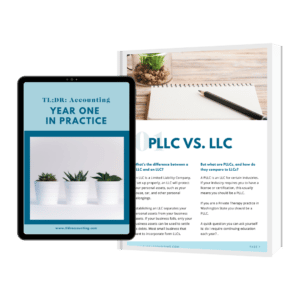
TL;DR: Accounting vs. Heard for Therapists: Which Is Right For You?
Accounting software or a CPA firm? Learn the real differences between Heard and CPA led accounting for therapists and how to choose what fits your private practice.



There are three common ways to structure a private practice: LLC, PLLC & S Corp. Which is best for your business? We scan your financials to figure out the most tax effective way to structure your private practice.
There are various tax deductions you can make depending on the structure of your practice. Do you use a home office? Do you commute to work? How much do you spend on office supplies? These are all things to take into consideration that may not be top of a mind for a general accountant.
Tax laws around deductions, credits & reimbursements are constantly changing. It's important to work with an accountant that knows the ins and outs of your industry in order to stay full across all benefits & tax advantages for each year's return.

Are you running a private practice?
This is our in-house resource for getting started with your finances in the first year.



Accounting software or a CPA firm? Learn the real differences between Heard and CPA led accounting for therapists and how to choose what fits your private practice.

Learn how therapists can calculate and pay estimated taxes in 2026, stay compliant with IRS rules, and avoid surprises at tax time.

Tax deductions for therapists in 2026 explained. Learn which expenses are still deductible and how good bookkeeping helps mental health professionals reduce taxes.